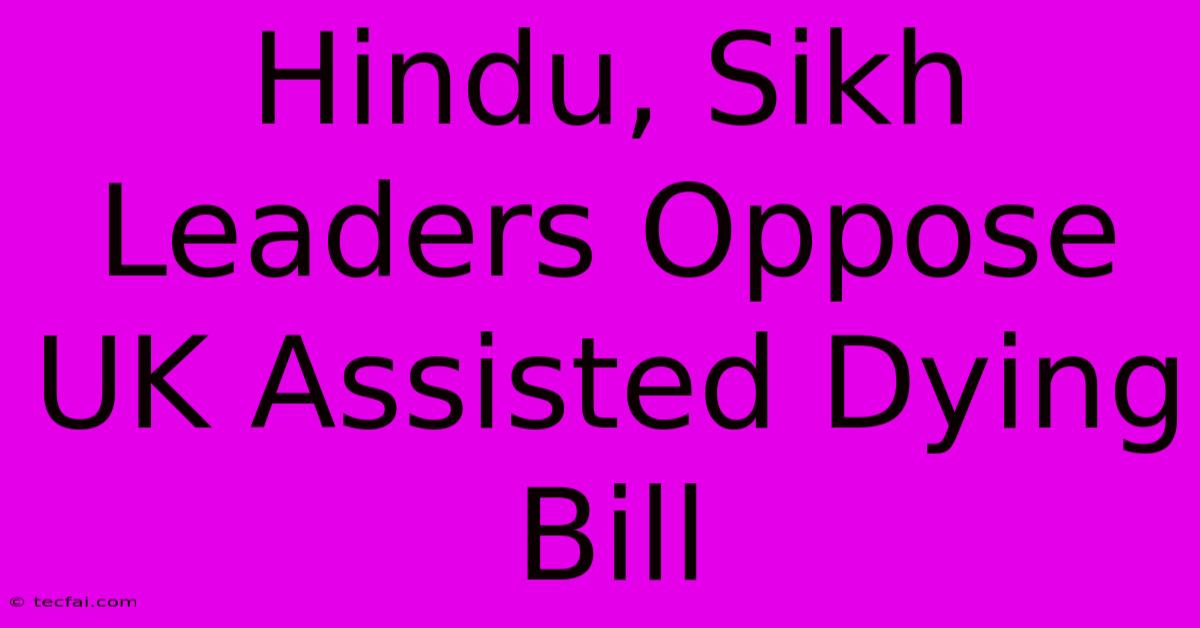Hindu, Sikh Leaders Oppose UK Assisted Dying Bill

Discover more detailed and exciting information on our website. Click the link below to start your adventure: Visit Best Website tecfai.com. Don't miss out!
Table of Contents
Hindu and Sikh Leaders Oppose UK Assisted Dying Bill: A Clash of Cultures and Compassion
The UK's ongoing debate surrounding assisted dying has ignited a passionate response from various religious communities, with prominent Hindu and Sikh leaders voicing strong opposition to the proposed legislation. This article explores the reasons behind their concerns, highlighting the clash between individual autonomy and deeply held religious beliefs regarding life, death, and the sanctity of human existence.
Core Tenets and Concerns
The proposed Assisted Dying Bill, while aiming to provide a compassionate option for terminally ill individuals, clashes fundamentally with the core tenets of Hinduism and Sikhism. Both religions emphasize the sanctity of life, viewing it as a gift from a higher power. Taking one's own life, or assisting in the process, is considered a grave transgression.
-
Hinduism: The concept of karma and reincarnation is central to Hindu belief. Ending one's life prematurely is believed to disrupt the natural cycle of life and death, potentially leading to negative consequences in future lives. Furthermore, the emphasis on dharma (righteous conduct) dictates against actions that deliberately cause harm or suffering, even to oneself. Hindu leaders argue that assisted dying undermines the importance of enduring suffering with dignity and finding solace in faith and family support.
-
Sikhism: Similar to Hinduism, Sikhism emphasizes the divine nature of life and the importance of accepting God's will. The principle of kirat karni (honest work), naam japna (remembering God's name), and vand chhakna (sharing with others) forms the foundation of Sikh life. Assisted dying is seen as a rejection of God's plan and a denial of the potential for spiritual growth even in the face of suffering. Leaders express concern that the legalization of assisted dying could disproportionately affect vulnerable members of the Sikh community, potentially due to pressure or misunderstanding.
Beyond Religious Doctrine: Practical Considerations
The opposition isn't solely based on religious doctrine. Hindu and Sikh leaders also raise practical concerns about the potential for abuse and exploitation. They worry that the legislation, despite its safeguards, may inadvertently lead to vulnerable individuals being pressured into ending their lives, particularly the elderly or those from marginalized communities. The lack of access to adequate palliative care is another key concern; improved palliative care, they argue, should be prioritized before considering assisted dying.
The Ongoing Debate: Balancing Compassion and Religious Freedom
The debate surrounding assisted dying in the UK is a complex one, highlighting the tension between individual autonomy and deeply held religious beliefs. While proponents emphasize the right of individuals to choose how they die, opponents, including Hindu and Sikh leaders, emphasize the sanctity of life and the potential for unintended consequences. Finding a balance that respects both individual rights and religious freedom is a crucial challenge for policymakers.
The discussion necessitates a nuanced understanding of cultural and religious perspectives. Ignoring these perspectives risks alienating significant portions of the population and undermining the principle of inclusivity. A robust public discourse, encompassing diverse viewpoints, is critical to finding a just and equitable solution. The ongoing debate highlights the need for thoughtful consideration and a commitment to finding common ground.
Keywords:
Assisted dying, UK, Hindu, Sikh, religious opposition, sanctity of life, karma, dharma, kirat karni, naam japna, vand chhakna, palliative care, end-of-life care, religious freedom, cultural sensitivity, ethical considerations, vulnerable individuals, legislation, debate, compassion.

Thank you for visiting our website wich cover about Hindu, Sikh Leaders Oppose UK Assisted Dying Bill. We hope the information provided has been useful to you. Feel free to contact us if you have any questions or need further assistance. See you next time and dont miss to bookmark.
Featured Posts
-
70 Year Old Woman Hurt In Nahariya Rocket Attack
Nov 26, 2024
-
Microsoft Fixes Outlook Service Disruption
Nov 26, 2024
-
Kendricks Not Like Us Drakes Legal Team Disputes Charts
Nov 26, 2024
-
Newcastle West Ham Live Match Score
Nov 26, 2024
-
Bet365 Anytime Td Bets Week 12
Nov 26, 2024
